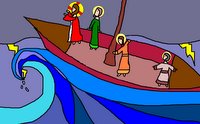Chesterton Quote of the Day
There are innumerable persons with eyeglasses and green garments who pray for the return of the maypole or the Olympian Games. But there is about these people a haunting and alarming something which suggests that it is just possible that they do not keep Christmas. If so, where is the sense of all their dreams of festive traditions? Here is a solid and ancient festive tradition still plying a roaring trade in the streets, and they think it vulgar. If this is so, let them be very certain of this: that they are the kind of people who in the time of the maypole would have thought the maypole vulgar; who in the time of the Canterbury pilgrimage would have thought the Canterbury pilgrimage vulgar; who in the time of the Olympian Games would have thought the Olympian Games vulgar. Nor can there be any reasonable doubt that they were vulgar. Let no man deceive himself; if by vulgarity we mean coarseness of speech, rowdiness of behaviour, gossip, horseplay, and some heavy drinking: vulgarity there always was, wherever there was joy, wherever there was faith in the gods.
'Heretics' via Chesterton Day by Day.
Not for nothing am I known in some circles as Joe "D'Exciting Revelry" McDonough. =>








